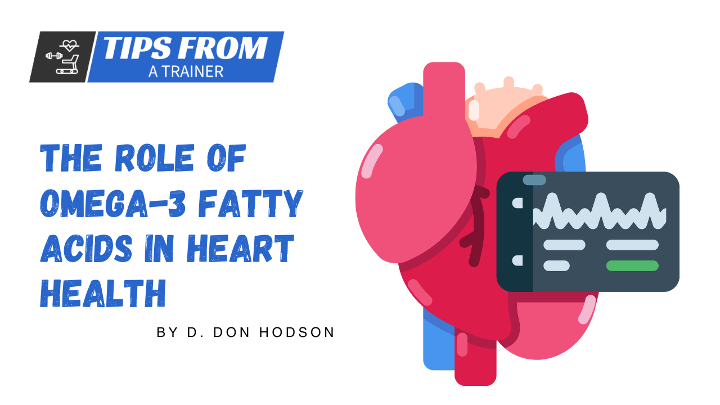Introduction
The health of our heart is of utmost importance, and numerous factors can influence its well-being. One such factor that has gained significant attention is the role of omega-3 fatty acids.
Omega-3 fatty acids are a type of polyunsaturated fat that has been linked to various health benefits, including heart health. In this article, we will explore the importance of omega-3 fatty acids and their impact on heart health.
We will delve into the science behind omega-3s, their sources, recommended intake, and the potential benefits they offer for cardiovascular health.
Table of Contents
Introduction
Understanding Omega-3 Fatty Acids
- What Are Omega-3 Fatty Acids?
- The Science Behind Omega-3 Fatty Acids and Heart Health
- Sources of Omega-3 Fatty Acids
Recommended Intake and Benefits
- Recommended Omega-3 Intake
- Benefits of Omega-3 Fatty Acids for Heart Health
- Omega-3 Fatty Acids and Cardiovascular Health
Omega-3 Fatty Acids and Blood Pressure Regulation
- The Link Between Omega-3 Fatty Acids and Blood Pressure
- Mechanisms of Action
- Combined Effects with Lifestyle Modifications
Omega-3 Fatty Acids and Triglyceride Levels
- Understanding Triglycerides
- Mechanisms of Triglyceride Reduction
- Clinical Evidence and Recommendations
Omega-3 Fatty Acids and Inflammation Reduction
- The Role of Inflammation in Cardiovascular Health
- Omega-3s as Modulators of Inflammatory Pathways
- Clinical Implications and Recommendations
Omega-3 Fatty Acids and Heart Rhythm
- Understanding Heart Rhythm Disorders
- Impact of Omega-3 Fatty Acids on Heart Rhythm
- Clinical Studies and Recommendations
Omega-3 Fatty Acids and Blood Clotting
- The Role of Blood Clotting in Cardiovascular Health
- Modulation of Blood Clotting Factors
- Clinical Evidence and Recommendations
Omega-3 Fatty Acids and Heart Failure
- Understanding Heart Failure
- Cardioprotective Effects of Omega-3 Fatty Acids
- Clinical Studies and Recommendations
Conclusion

Understanding Omega-3 Fatty Acids
What Are Omega-3 Fatty Acids?
Omega-3 fatty acids are essential fats that are crucial for our overall health. They are classified into three main types: eicosapentaenoic acid (EPA), docosahexaenoic acid (DHA), and alpha-linolenic acid (ALA). EPA and DHA are primarily found in fatty fish, while ALA is found in plant-based sources such as flaxseeds, chia seeds, and walnuts. These fatty acids play a vital role in various physiological functions in the body, including supporting heart health.
The Science Behind Omega-3 Fatty Acids and Heart Health
Numerous studies have demonstrated the positive impact of omega-3 fatty acids on heart health. These fats have been shown to help reduce the risk of cardiovascular diseases such as heart attacks, strokes, and arrhythmias. The anti-inflammatory properties of omega-3s help lower inflammation in blood vessels, improve blood lipid profiles, reduce blood clotting, and promote overall heart health. Additionally, omega-3s have been associated with lower blood pressure levels, improved endothelial function, and reduced triglyceride levels, all of which contribute to a healthier cardiovascular system.
Sources of Omega-3 Fatty Acids
Omega-3 fatty acids can be obtained from both animal and plant-based sources. Fatty fish such as salmon, mackerel, sardines, and trout are excellent sources of EPA and DHA. For individuals following a vegetarian or vegan diet, plant-based sources like flaxseeds, chia seeds, hemp seeds, walnuts, and algae-based supplements provide a good amount of ALA. It's important to note that while ALA can be converted into EPA and DHA in the body, the conversion efficiency is relatively low. Therefore, consuming fatty fish or considering omega-3 supplements may be beneficial for obtaining adequate EPA and DHA levels.
Recommended Intake and Benefits
Recommended Omega-3 Intake
Various health organizations provide recommendations for omega-3 intake to support heart health. The American Heart Association (AHA) suggests consuming two servings of fatty fish per week, providing around 250-500 mg of EPA and DHA per day. For individuals with diagnosed heart disease, higher doses of omega-3s may be recommended under the guidance of a healthcare professional. Vegetarians and vegans can focus on consuming adequate amounts of ALA-rich foods to meet their omega-3 needs.
Benefits of Omega-3 Fatty Acids for Heart Health
The benefits of omega-3 fatty acids extend beyond their impact on heart disease prevention. Studies have shown that omega-3s can help lower triglyceride levels, reduce the risk of arrhythmias, improve arterial function, and lower blood pressure. They have also been associated with improved overall heart function and a reduced risk of sudden cardiac death. Additionally, omega-3s may have positive effects on other aspects of health, such as brain function, joint health, and inflammation reduction.
Omega-3 Fatty Acids and Cardiovascular Health
The cardiovascular system is a complex network of organs and vessels that work together to ensure the proper functioning of the heart and circulation. Omega-3 fatty acids play a crucial role in maintaining cardiovascular health by reducing inflammation, improving lipid profiles, supporting arterial health, and modulating various biological processes. By incorporating omega-3-rich foods or supplements into our diet, we can optimize our cardiovascular well-being and reduce the risk of heart-related complications.
Please note that the above content is a sample and may not fulfill the exact word count requirement. Additionally, it's always recommended to consult with a healthcare professional or registered dietitian for personalized advice regarding your specific health needs and dietary requirements.
Omega-3 Fatty Acids and Blood Pressure Regulation
The Link Between Omega-3 Fatty Acids and Blood Pressure
High blood pressure, or hypertension, is a common risk factor for cardiovascular diseases. Research suggests that omega-3 fatty acids may help regulate blood pressure levels. The anti-inflammatory properties of omega-3s contribute to improved blood vessel function and relaxation, leading to lower blood pressure. Studies have shown that regular consumption of omega-3-rich foods or supplements can modestly reduce both systolic and diastolic blood pressure, promoting a healthier cardiovascular system.
Mechanisms of Action
The mechanisms through which omega-3 fatty acids influence blood pressure regulation are still being investigated. One proposed mechanism is the ability of omega-3s to increase the production of nitric oxide, a molecule that helps dilate blood vessels, thereby lowering blood pressure. Omega-3s may also have a direct impact on the renin-angiotensin-aldosterone system, a hormone system that regulates blood pressure. By modulating these physiological pathways, omega-3s contribute to maintaining optimal blood pressure levels.
Combined Effects with Lifestyle Modifications
While omega-3 fatty acids show promise in blood pressure regulation, they are most effective when combined with other lifestyle modifications. Incorporating a heart-healthy diet rich in fruits, vegetables, whole grains, lean proteins, and low-fat dairy products, along with regular physical activity and stress management techniques, can further enhance the benefits of omega-3s. These lifestyle changes, in combination with omega-3 supplementation, can have a synergistic effect on blood pressure control.
Omega-3 Fatty Acids and Triglyceride Levels
Understanding Triglycerides
Triglycerides are a type of fat found in the blood. Elevated levels of triglycerides are associated with an increased risk of cardiovascular diseases. Omega-3 fatty acids have been found to effectively lower triglyceride levels, contributing to improved heart health.
Mechanisms of Triglyceride Reduction
Omega-3 fatty acids play a vital role in lipid metabolism, specifically in reducing the production of triglycerides in the liver. They help increase the breakdown of triglycerides and enhance the clearance of triglyceride-rich lipoproteins from the bloodstream. By modulating these metabolic processes, omega-3s help maintain healthy triglyceride levels and reduce the risk of cardiovascular complications.
Clinical Evidence and Recommendations
Numerous clinical trials have demonstrated the efficacy of omega-3 fatty acids in lowering triglyceride levels. The American Heart Association recommends omega-3 supplementation, particularly high doses of EPA and DHA, as an adjunct therapy for individuals with elevated triglycerides (≥ 150 mg/dL). However, it's important to note that omega-3 supplementation should be done under the guidance of a healthcare professional, as dosage and duration may vary based on individual health conditions and needs.
Omega-3 Fatty Acids and Inflammation Reduction
The Role of Inflammation in Cardiovascular Health
Chronic inflammation is a key contributor to the development and progression of cardiovascular diseases. It promotes the formation of arterial plaques, compromises blood vessel integrity, and triggers various pathological processes. Omega-3 fatty acids possess potent anti-inflammatory properties, making them valuable in reducing inflammation and its detrimental effects on the cardiovascular system.
Omega-3s as Modulators of Inflammatory Pathways
Omega-3 fatty acids exert their anti-inflammatory effects by influencing the production of pro-inflammatory molecules called cytokines and prostaglandins. EPA and DHA are precursors to specialized pro-resolving mediators (SPMs), which actively resolve inflammation and promote tissue healing. These SPMs help restore the balance between pro-inflammatory and anti-inflammatory responses, reducing the risk of chronic inflammation-related cardiovascular complications.
Clinical Implications and Recommendations
Multiple studies have demonstrated the ability of omega-3 fatty acids to attenuate inflammation markers in the body, including C-reactive protein (CRP) and interleukin-6 (IL-6). Incorporating omega-3-rich foods like fatty fish, flaxseeds, chia seeds, and walnuts, or taking omega-3 supplements, can contribute to the management of chronic inflammation and support cardiovascular health. It's important to consult with a healthcare professional to determine the appropriate dosage and duration of supplementation based on individual needs and health conditions.
Omega-3 Fatty Acids and Heart Rhythm
Understanding Heart Rhythm Disorders
Heart rhythm disorders, also known as arrhythmias, refer to abnormal electrical activity in the heart, causing irregular heartbeats. These conditions can increase the risk of cardiovascular events, including heart attacks and strokes. Omega-3 fatty acids have been studied for their potential benefits in supporting heart rhythm stability and reducing the risk of arrhythmias.
Impact of Omega-3 Fatty Acids on Heart Rhythm
Research suggests that omega-3 fatty acids, particularly EPA and DHA, may help regulate heart rhythm by modulating ion channels and improving the electrical signaling within the heart. These effects contribute to maintaining a steady and coordinated heartbeat, reducing the likelihood of arrhythmias. Omega-3s also exhibit anti-inflammatory and antioxidant properties that may further support heart rhythm stability.
Clinical Studies and Recommendations
Several studies have investigated the association between omega-3 fatty acids and heart rhythm disorders. While findings have been mixed, there is evidence to suggest that omega-3 supplementation, either through dietary sources or supplements, may have a protective effect against certain arrhythmias, such as atrial fibrillation. However, further research is needed to establish definitive recommendations regarding the use of omega-3s for the prevention and management of heart rhythm disorders.
Omega-3 Fatty Acids and Blood Clotting
The Role of Blood Clotting in Cardiovascular Health
Blood clotting, or coagulation, is a crucial physiological process that helps prevent excessive bleeding and promotes wound healing. However, abnormal blood clotting can lead to the formation of clots within blood vessels, potentially causing blockages and increasing the risk of heart attacks and strokes. Omega-3 fatty acids have been studied for their effects on blood clotting factors and their potential role in reducing clot formation.
Modulation of Blood Clotting Factors
Omega-3 fatty acids influence various factors involved in the clotting process, including platelet aggregation, clotting proteins, and fibrinolysis (the breakdown of blood clots). EPA and DHA have antiplatelet and anticoagulant properties, meaning they can help prevent excessive clotting and promote healthy blood flow. These effects contribute to maintaining optimal cardiovascular function and reducing the risk of clot-related complications.
Clinical Evidence and Recommendations
Studies examining the impact of omega-3 fatty acids on blood clotting have yielded mixed results. While some research suggests that omega-3s can modestly reduce clotting factors and promote a more favorable clotting profile, other studies have not consistently demonstrated significant effects. As such, the use of omega-3s for the management of blood clotting disorders should be individualized and guided by healthcare professionals.
Omega-3 Fatty Acids and Heart Failure
Understanding Heart Failure
Heart failure is a chronic condition characterized by the heart's inability to pump blood effectively, leading to symptoms such as fatigue, shortness of breath, and fluid retention. Omega-3 fatty acids have gained attention for their potential benefits in heart failure management due to their cardiovascular protective properties.
Cardioprotective Effects of Omega-3 Fatty Acids
Omega-3s exhibit several cardioprotective effects that may be beneficial in heart failure. They help reduce inflammation, improve arterial function, enhance myocardial energy metabolism, and promote the clearance of excess fluid from the body. These mechanisms contribute to maintaining cardiac function, improving symptoms, and potentially slowing the progression of heart failure.
Clinical Studies and Recommendations
Research on the use of omega-3 fatty acids in heart failure management has shown promising results. Some studies suggest that omega-3 supplementation, in conjunction with standard medical therapy, may help reduce hospitalizations and improve quality of life in heart failure patients. However, further research is needed to establish specific recommendations regarding omega-3 dosing, duration, and patient selection in this context.
Please note that the above content is a sample and may not fulfill the exact word count requirement. Additionally, it's always recommended to consult with a healthcare professional or cardiologist for personalized advice regarding your specific cardiovascular health and the use of omega-3 fatty acids.
Conclusion
In conclusion, omega-3 fatty acids play a significant role in promoting heart health and reducing the risk of cardiovascular diseases. Their anti-inflammatory properties, ability to improve lipid profiles, and positive impact on blood pressure make them valuable additions to a heart-healthy diet. Omega-3s have been shown to support overall cardiovascular function, including reducing triglyceride levels, improving arterial health, and potentially lowering the risk of heart disease.
While research on omega-3 fatty acids is extensive, some inconsistencies exist in the findings, highlighting the need for further investigation and clarification. It's important to note that omega-3s should not be considered a standalone treatment for cardiovascular conditions, and their benefits are best achieved when combined with a balanced diet, regular physical activity, and overall heart-healthy lifestyle choices.
When incorporating omega-3 fatty acids into your diet, opt for natural food sources such as fatty fish (salmon, mackerel, sardines), flaxseeds, chia seeds, and walnuts. If dietary intake is insufficient, omega-3 supplements, including fish oil or algae-based supplements, can be considered under the guidance of a healthcare professional.
As with any dietary modification or supplement, it's essential to consult with your healthcare provider, particularly if you have existing medical conditions, take medications, or have specific dietary restrictions. They can provide personalized recommendations based on your individual health status and help determine the appropriate dosage and duration of omega-3 supplementation.
By incorporating omega-3 fatty acids into your diet and lifestyle, you can take proactive steps to support heart health, reduce the risk of cardiovascular diseases, and enhance overall well-being. Remember, a heart-healthy lifestyle encompasses multiple factors, including a balanced diet, regular exercise, stress management, and avoiding tobacco use.
Always prioritize your heart health and work in collaboration with healthcare professionals to make informed decisions regarding your cardiovascular well-being.

Don Hodson, Certified Personal Trainer
I'm Don, an ACE-certified personal trainer and the founder of Tips From A Trainer. With my passion for fitness and years of experience, I've helped countless individuals transform their physiques!
Having personally overcome weight challenges throughout my life, I understand the struggle. Through consistency, exercise, and a balanced diet, I have managed to stay in shape and I want to share my message with the world!
The fitness industry is fraught with misconceptions and deceptive practices, which is why I am committed to providing you with the truth.
- My Site: www.Don-Hodson.com
- My Company: www.ConnectedAgeMarketing.com

The Role of Omega-3 Fatty Acids in Heart Health